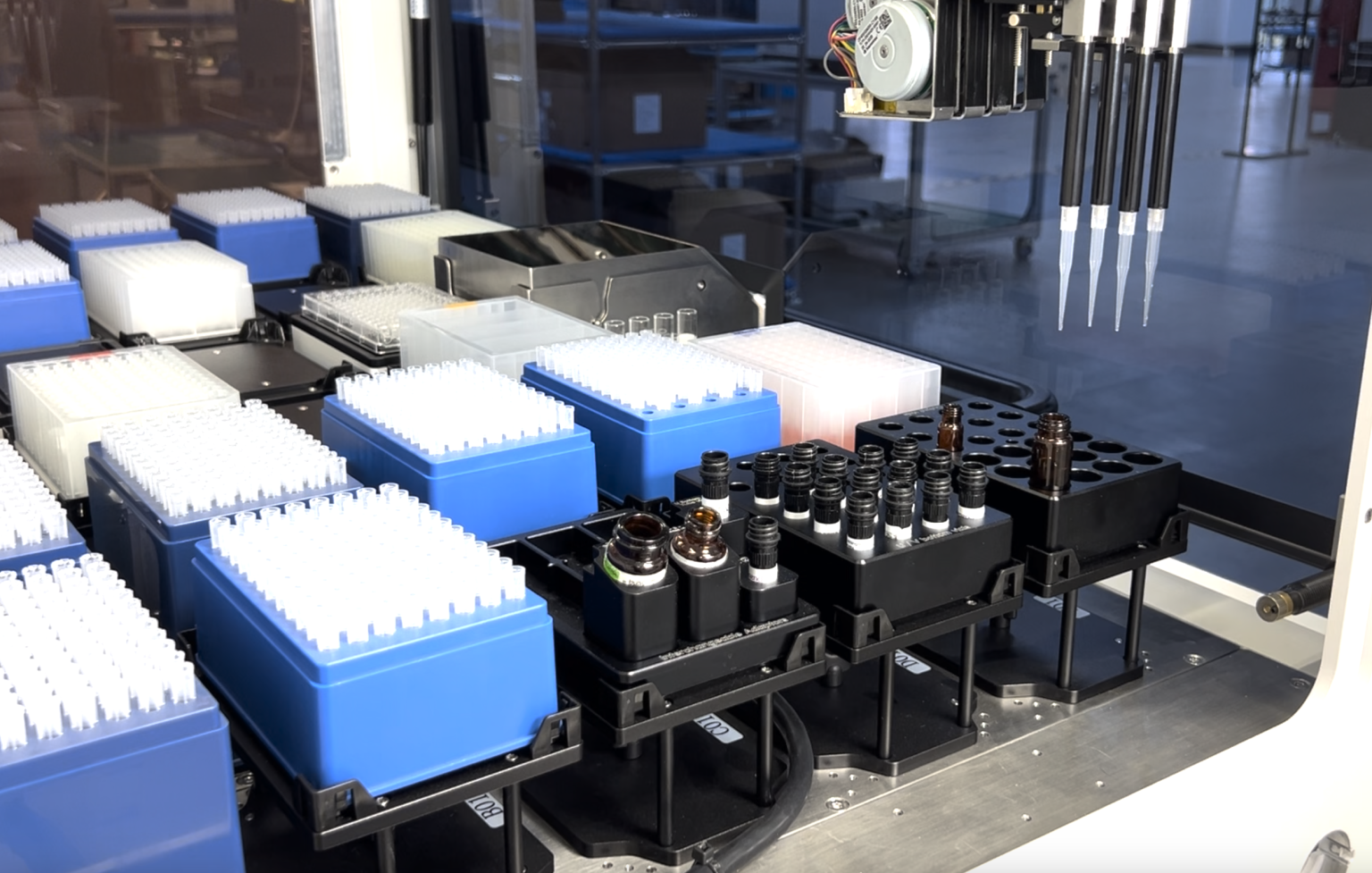

By Raffaele Lu, Automation Engineer Lead | Edited by Melvin Lye, Senior Director of Scientific Affairs
In the world of pharmaceutical research and clinical development, flow cytometry is a cornerstone of immune profiling, biomarker validation, and cell-based screening. As the field evolves toward increasingly complex, multi-parameter panels, one critical aspect of the workflow remains surprisingly vulnerable to human error: the manual preparation of antibody cocktails.
Despite advanced instrumentation downstream, many labs continue to rely on manual pipetting to prepare antibody master mixes. While this approach may seem manageable on a small scale, it introduces significant risk, especially when working with high-value reagents for screening campaigns, clinical trials, or large-scale immunophenotyping panels.
Antibody cocktail preparation in flow cytometry workflows is a time-consuming, high-stakes step. Each vial and pipette action carries the potential for costly mistakes—from incorrect pipetting volumes and skipped mixing steps to accidental drops or contamination.
One key opinion leader recently noted that preparing antibody cocktails by hand takes hours and is inherently fragile. In their words, “If one vial is mishandled or dropped, that’s a $10,000 mistake—and a week of progress lost.” In high-throughput environments, that kind of operational loss is not just inconvenient—it’s unsustainable.
This concern is echoed in insights shared by the cytometry community, such as those featured on Colibri Cytometry’s blog, which highlights the challenges of maintaining stability, consistency, and repeatability in manual antibody master mix preparations.
Furthermore, pipetting inconsistency—especially in teams with multiple users—creates variability that is difficult to detect, but can severely compromise the quality and reproducibility of results. These inconsistencies are particularly problematic in regulated environments or multi-site studies, where reproducibility and standard operating procedures (SOPs) are essential.
To address these challenges head-on, Curiox Biosystems developed the C-FREE™ Pluto Workstation, a purpose-built system that automates the most error-prone steps of flow cytometry sample preparation. Designed for antibody master mix prep and staining, Pluto replaces manual labor with robust protocol generation and precision-engineered liquid handling—all within a compact benchtop footprint.
Pluto’s automation platform eliminates manual pipetting, thereby removing the risk of reagent mishandling and human variability. Each protocol is executed automatically, ensuring every sample receives the correct volume, mixing cycle, and incubation timing without deviation. This level of control is especially important when preparing complex panels involving single-color controls or fluorescence minus one (FMO) configurations, where even a small inconsistency can derail downstream analysis.
Temperature-sensitive antibody stocks are also protected throughout the workflow thanks to Pluto’s integrated cold block modules, which support a wide range of tube and plate formats. This flexibility allows laboratories to use their preferred antibody suppliers—including BD, BioLegend, and Beckman—without changing their consumables or protocols.

As automation becomes a necessary part of achieving reproducibility in pharmaceutical assays, Pluto stands out by addressing two major industry needs: operational consistency and regulatory readiness. With every run, Pluto logs exact reagent volumes, tip usage, incubation steps, and plate layouts—ensuring full traceability and compliance with quality standards expected in GMP or GLP settings.
Pharma labs, contract research organizations (CROs), and clinical trial centers are under increasing pressure to harmonize sample preparation processes across sites. A workflow that produces slightly different antibody concentrations from one operator to the next can undermine critical readouts. Pluto Workstation ensures that every run is consistent, regardless of who’s using it, or where the study is being conducted.
Automating antibody cocktailing with Pluto is not just a technical improvement—it is a strategic advantage. By eliminating the risk of batch failures caused by human error, labs can reduce operational costs and accelerate their timelines. This is especially critical when working with rare antibodies, limited patient samples, or time-sensitive screening campaigns.
The system also increases productivity by transforming what was once hours of hands-on pipetting into fully walk-away workflows. Scientists and technicians can shift their time toward data analysis, assay development, and high-impact decision-making, rather than repetitive liquid handling.
Importantly, Pluto is priced to support broad adoption—not just in centralized flow cores, but also in small- to mid-sized labs looking to modernize their workflows without a $250,000+ automation investment. With entry-level systems starting below $54,000, Pluto brings professional-grade standardization to the bench without breaking the budget.
Whether supporting an immuno-oncology program, screening compound libraries, or characterizing immune subsets in clinical samples, Pluto can adapt to fit the use case. Its throughput ranges from 8 to 96 wells per run, and it accommodates a wide variety of sample types including whole blood, PBMCs, bone marrow, and suspension cell lines.
Laboratories using Pluto report improved reproducibility, greater batch-to-batch consistency, and fewer experimental do-overs. As noted by key opinion leaders in the field, the ability to execute robust, standardized workflows—without the fragility of manual intervention—is now seen as a necessity for rigorous flow cytometry, not a luxury.
In today’s pharmaceutical landscape, where research timelines are compressed and scientific rigor is under the microscope, labs cannot afford to let manual errors undermine their results. Automating antibody master mix preparation with Pluto provides a practical, scalable, and regulation-friendly path forward.
By minimizing the risk of human error, improving consistency across runs, and freeing up valuable scientist time, Pluto enables flow cytometry teams to focus on discovery—not damage control.